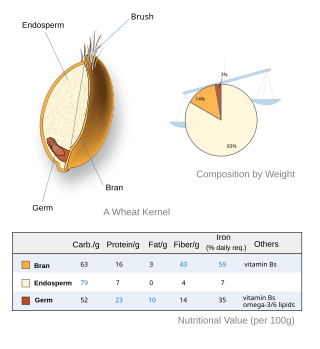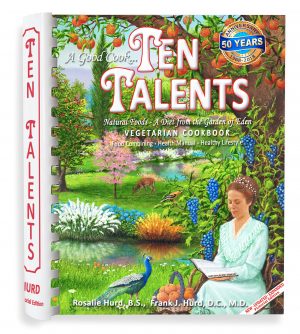Related Research Articles

Gluten is a structural protein naturally found in certain cereal grains. Although "gluten" often only refers to wheat proteins, in medical literature it refers to the combination of prolamin and glutelin proteins naturally occurring in all grains that have been proven capable of triggering celiac disease. These include any species of wheat, barley, rye and some oat cultivars, as well as any cross hybrids of these grains. Gluten makes up 75–85% of the total protein in bread wheat.

Wheat is a grass widely cultivated for its seed, a cereal grain that is a worldwide staple food. The many species of wheat together make up the genus Triticum ; the most widely grown is common wheat. The archaeological record suggests that wheat was first cultivated in the regions of the Fertile Crescent around 9600 BCE. Botanically, the wheat kernel is a type of fruit called a caryopsis.

Bread is a staple food prepared from a dough of flour and water, usually by baking. Throughout recorded history and around the world, it has been an important part of many cultures' diet. It is one of the oldest human-made foods, having been of significance since the dawn of agriculture, and plays an essential role in both religious rituals and secular culture.

The oat, sometimes called the common oat, is a species of cereal grain grown for its seed, which is known by the same name. While oats are suitable for human consumption as oatmeal and rolled oats, one of the most common uses is as livestock feed. Oats are a nutrient-rich food associated with lower blood cholesterol when consumed regularly.

Rye is a grass grown extensively as a grain, a cover crop and a forage crop. It is a member of the wheat tribe (Triticeae) and is closely related to both wheat and barley. Rye grain is used for flour, bread, beer, crispbread, some whiskeys, some vodkas, and animal fodder. It can also be eaten whole, either as boiled rye berries or by being rolled, similar to rolled oats.

Breakfast cereal is a breakfast food made from processed cereal grains. It is traditionally eaten as part of breakfast, or a snack food, primarily in Western societies.

Seitan is a food made from gluten, the main protein of wheat. It is also known as miànjīn, fu, milgogi, wheat meat, gluten meat, vital wheat gluten or simply gluten. It is made by washing wheat flour dough with water until most of the starch granules have been removed, leaving behind the sticky, insoluble gluten as an elastic mass, which is then cooked and eaten.

A gluten-free diet (GFD) is a nutritional plan that strictly excludes gluten, which is a mixture of proteins found in wheat, as well as barley, rye, and oats. The inclusion of oats in a gluten-free diet remains controversial, and may depend on the oat cultivar and the frequent cross-contamination with other gluten-containing cereals.

Neal D. Barnard, born 10 July 1953 in Fargo, North Dakota, is an American author, clinical researcher, and founding president of the Physicians Committee for Responsible Medicine (PCRM).

A healthy diet is a diet that maintains or improves overall health. A healthy diet provides the body with essential nutrition: fluid, macronutrients such as protein, micronutrients such as vitamins, and adequate fibre and food energy.

A whole grain is a grain of any cereal and pseudocereal that contains the endosperm, germ, and bran, in contrast to refined grains, which retain only the endosperm.

The China Study: The Most Comprehensive Study of Nutrition Ever Conducted and the Startling Implications for Diet, Weight Loss and Long-term Health is a book by T. Colin Campbell and his son, Thomas M. Campbell II. The book argues for health benefits of a whole food plant-based diet. It was first published in the United States in January 2005 and had sold over one million copies as of October 2013, making it one of America's best-selling books about nutrition.
Loren Cordain is an American scientist who specializes in the fields of nutrition and exercise physiology. He is notable as an advocate of the Paleolithic diet.

Mark Adam Hyman is an American physician and author. He is the founder and medical director of The UltraWellness Center and was a columnist for The Huffington Post. Hyman was a regular contributor to the Katie Couric Show until the show's cancellation in 2013. He writes a blog called The Doctor’s Farmacy, which examines many topics related to human health and welfare. He is the author of several books on nutrition and longevity, including Food Fix, Eat Fat, Get Thin, and Young Forever.
David Perlmutter is a Naples, Florida–based American celebrity doctor and author.
Non-celiac gluten sensitivity (NCGS) or gluten sensitivity is "a clinical entity induced by the ingestion of gluten leading to intestinal and/or extraintestinal symptoms that improve once the gluten-containing foodstuff is removed from the diet, and celiac disease and wheat allergy have been excluded".

A baking mix is a mixed formulation of ingredients used for the cooking of baked goods. Baking mixes may be commercially manufactured or homemade. Baking mixes that cater to particular dietary needs, such as vegan, gluten-free, or kosher baking mixes, can be bought in many places.

Bulgur, or burghul, is a cracked wheat foodstuff found in West Asian cuisine.

Ten Talents is a vegetarian and vegan cookbook originally published in 1968 by Rosalie Hurd and Frank J. Hurd. At the time, it was one of the few resources for vegetarian and vegan cooks. The cookbook promotes Christian vegetarianism and a Bible-based diet, in keeping with teachings of the Seventh-day Adventist Church. By 1991, the 750-recipe cookbook was entering its 44th printing and had sold more than 250,000 copies. An expanded edition with more than 1,000 recipes was issued in 2012.
References
- ↑ "CBS This Morning: Against the Grain - Doctor on how to fight "Wheat Belly"". CBS News . Retrieved December 16, 2012.
- ↑ "Are You Addicted to Wheat?". 30 November 2012. Retrieved December 16, 2012.
- 1 2 3 Brouns, Fred; Vincent J van Buul; Peter R Shewry (September 2013). "Does wheat make us fat and sick?". Journal of Cereal Science. 58 (2): 209–215. doi: 10.1016/j.jcs.2013.06.002 .
- 1 2 3 Jones, Julie (July–August 2012). "Wheat Belly—An analysis of selected statements and basic theses from the book" (PDF). Cereal Foods World. 57 (4): 177–189. doi:10.1094/CFW-57-4-0177.
- ↑ "Wheat Belly arguments are based on shaky science, critics say". Retrieved October 31, 2019.
- ↑ "AACC International Publishes Science-Based Response to Wheat Belly". Retrieved October 31, 2019.
- ↑ Whitney, Eleanor Noss; Rolfes, Sharon Rady; Crowe, Tim; Walsh, Adam. (2019). Understanding Nutrition. Cengage Learning Australia. pp. 321-323. ISBN 9780170424431
- ↑ Quick, David (September 11, 2012). "'Wheat Belly' continues its run on NYT Best Seller list, but is demonizing wheat and gluten justified?". The Post and Courier. Retrieved December 16, 2012.
- ↑ Doctor Oz Episode May 24, 2013
- ↑ Hall, Harriet. (2014). Food myths: what science knows (and does not know) about diet and nutrition. Skeptic 19 (4): 10-20.
- ↑ Dr. William Davis: Wheat Is Cause of Obesity and "Most Perverted Food on Store Shelves.", By Camille Lamb Thu., Dec. 13 2012 at 12:47 PM, "Miami New Times". Original quote: "Davis is not an advocate of vegan diets, but he says that it is possible to stay wheat- and grain-free on a healthy plant-based diet. For vegans, he recommends replacing grains with non-GMO vegetables, fruits, soy and other legumes, seeds (like chia and hemp), and nuts".